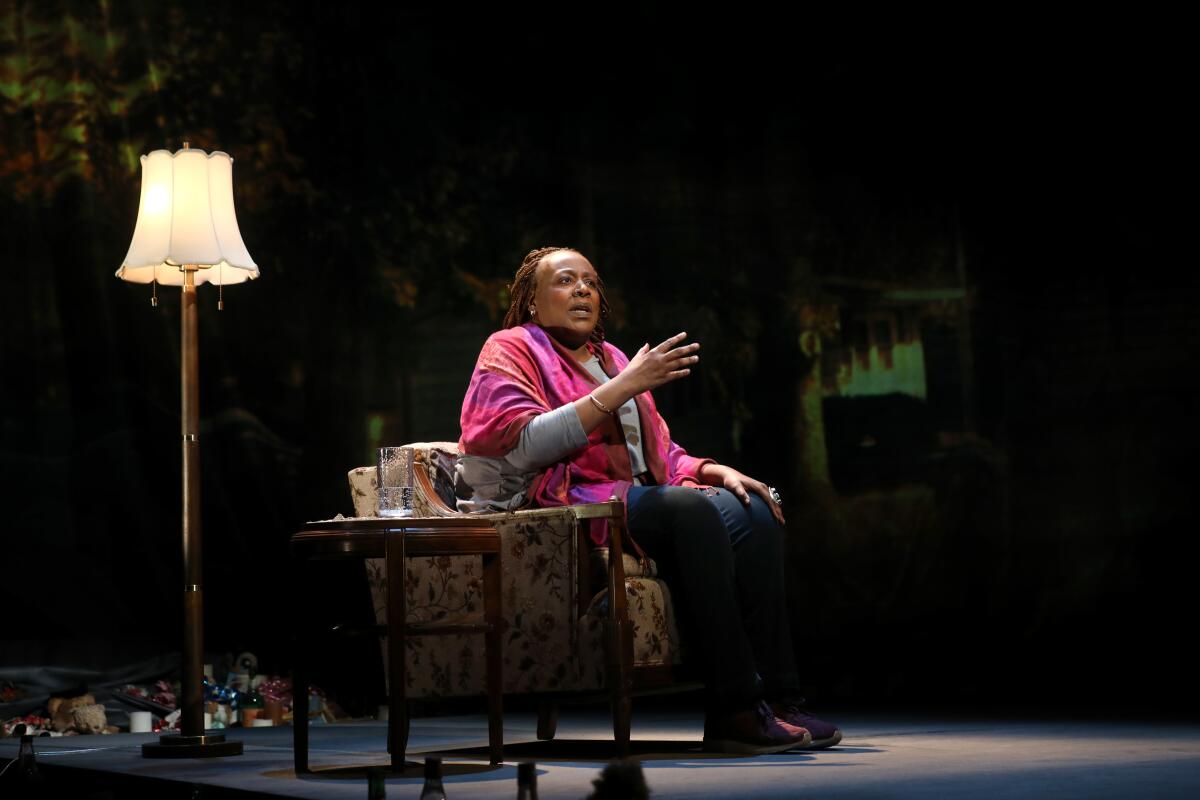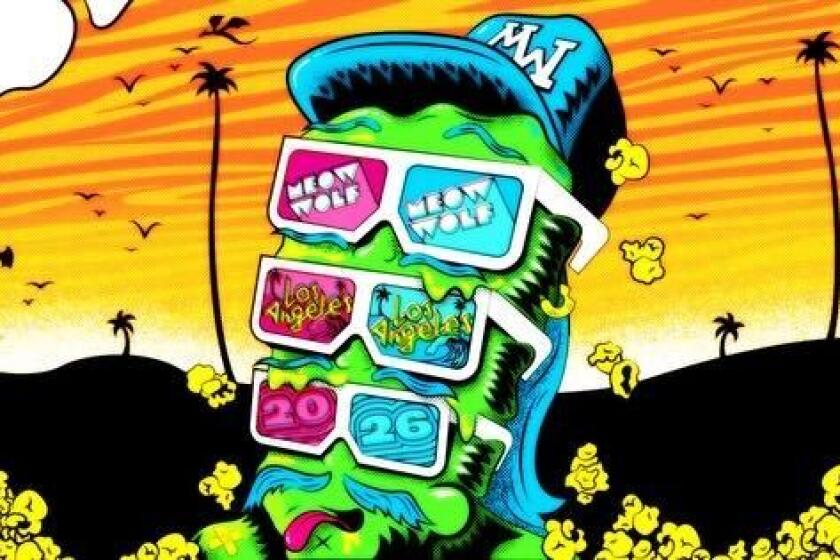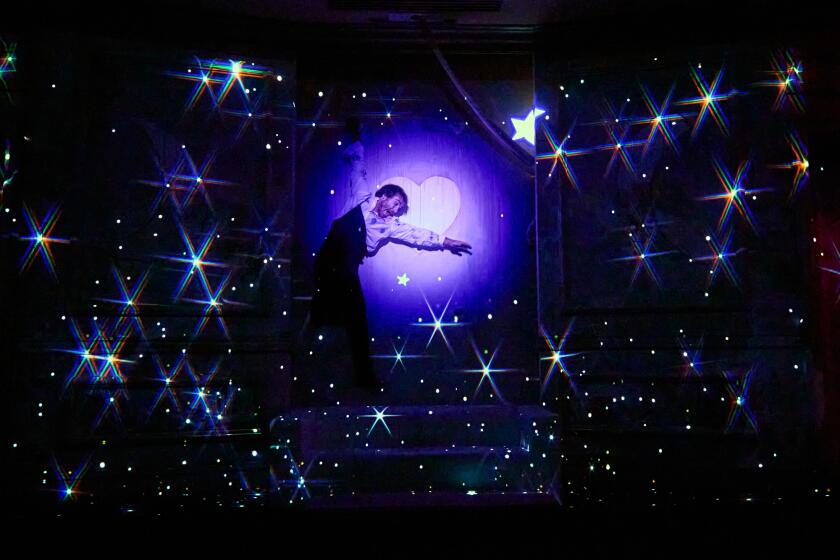Review: In ‘Until the Flood,’ Dael Orlandersmith searches for truth after Ferguson

At first glance, Dael Orlandersmith’s solo piece “Until the Flood” resembles a documentary collage by Anna Deavere Smith. But the rawness of the pain and poetry betrays Orlandersmith’s unmistakable stamp, as do the clarifying gusts of backlogged fury.
The play, which opened Wednesday at the Kirk Douglas Theatre, examines the community fallout after the fatal officer-involved shooting of Michael Brown in Ferguson, Mo. Like Smith, Orlandersmith is hunting for deeper societal truths that journalism usually doesn’t have the bandwidth to handle.
Commissioned by the Repertory Theatre of St. Louis, where “Until the Flood” had its premiere in 2016, the work was informed by interviews Orlandersmith conducted with a cross-section of people in and around Ferguson who have vastly different perspectives on the incident that turned the town into a flashpoint in America’s never-ending struggle for racial justice. Conflict, the Aristotelian crux of drama, is in oversupply.
But Orlandersmith isn’t shaping verbatim testimony. Her research laid the ground for her imagination to take over. The characters are composites. She’s written them in a way that will resonate with those who have seen “The Gimmick,” “Monster,” “Yellowman,” “Beauty’s Daughter” or any of her overpowering works that set wrath and resiliency against each other in the soul’s fight for survival.
The production, directed by Neel Keller with a finesse that never calls undue attention to itself, presents a stage with a few different seating options representing a living room, a flexible public venue and a barbershop. These spaces coexist as Orlandersmith transforms herself from one figure to the next by merely throwing on a shawl or a baseball jacket.
Mary Louise Geiger’s lighting adds grace notes to Takeshi Kata’s scenic design, which turns the perimeter of the stage into an impromptu street shrine. Kaye Voyce’s costume suggestions offer Orlandersmith all that she needs to paint full-scale theatrical portraits. Collaborating again with Keller, she seems in relaxed command of her artistry.
Contradiction interests this playwright, actor and performance artist more than confirmation. Connie, a university teacher, recalls a conversation at a Ferguson wine bar that ended a friendship. After contending that “both lives are tragic” (meaning Michael Brown and the police officer who killed him), she’s confounded by the reaction of her friend, who tells her, “My God! How I hate liberals. At least with an out-and-out bigot, I know where I stand.”
Louisa, a retired black educator who left Ferguson to go to New York’s City College, remembers the way the white proprietor of a store her family had long frequented accused her of being uppity after she returned from college. What enraged Louisa, however, wasn’t so much the hackneyed racism of this assumption but the smirk on the face of the black girl who worked there — a smirk Louisa took to mean, “You think you’re better than me? You think ’cause you went east, talk different, that you’re better than me?”
Orlandersmith doesn’t focus on the controversial question of whether the officer was operating in self-defense. Instead, she explores how the tragedy resonates among black and white residents. “Until the Flood” exposes the way the long-standing racial division in this community isn’t simply a historical memory but a living reality reinforced by the entrenched prejudices of a white-dominated police force.
Black psyches bear the wounds of slain, harassed and incarcerated black bodies. Paul, a young man who plans to study art history at Berkeley, prays that he’ll be able to escape the town before he’s gunned down like Brown. Stopped by a cop while walking with some art books, he knows the odds are stacked against him if he remains.
Progressives, such as the two Northwestern University students who paid a visit to the barbershop while doing a project on Michael Brown as a show of solidarity with “victims” of racial oppression, are briskly satirized. Rabid racists such as Dougray, a white father who pulled himself up by his bootstraps, are treated with more patience. Orlandersmith doesn’t conceal the monstrousness of their views. In fact, she lances the abscess of their hate to shed sterilizing light on the infection.
But evil fascinates her because she knows it usually has a back story of suffering. Brutality begets brutality. White supremacists aren’t exonerated by any means, but Orlandersmith refuses to sacrifice her compassion on the altar of vengeance. She recognizes violence as a universal scourge.
This approach is not to be confused with Connie’s belief that there is a balance of tragedy or with President Trump’s inflammatory Charlottesville comment about “very fine people on both sides.” History has definitely not been evenhanded. But though centered on an incident that peels back the deplorable disparities in social justice, the play is written with as much empathy as outrage.
At the end of this 70-minute piece, Orlandersmith unbinds her dreadlocks and gives expression to America’s racial stalemate with lyrical flow. “Has the ‘we shall overcome’ — come/and/Gone?” she asks. Compact yet encompassing, “Until the Flood” quietly assures that the struggle lives on.
'Until the Flood'
Where: Kirk Douglas Theatre, 9820 Washington Blvd., Culver City
When: 8 p.m. Tuesdays-Fridays, 2 and 8 p.m. Saturdays, 1 and 6:30 p.m. Sundays, through Feb. 23 (call for exceptions)
Tickets: $30-$75 (subject to change)
Info: (213) 628-2772 or www.centertheatregroup.org
Running time: 1 hour and 10 minutes (no intermission)
More to Read
The biggest entertainment stories
Get our big stories about Hollywood, film, television, music, arts, culture and more right in your inbox as soon as they publish.
You may occasionally receive promotional content from the Los Angeles Times.







